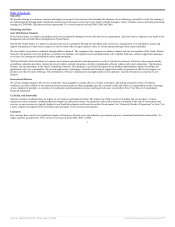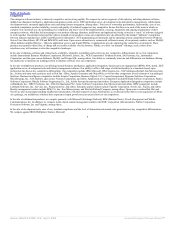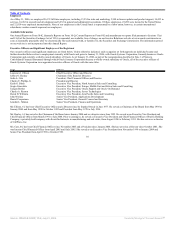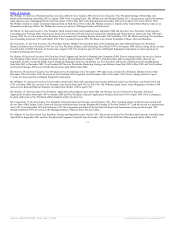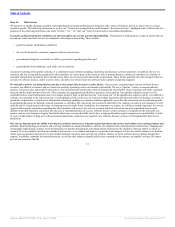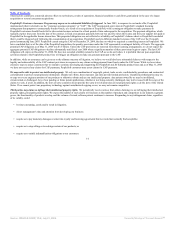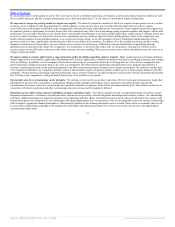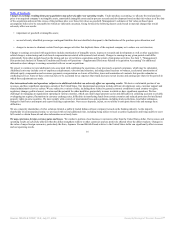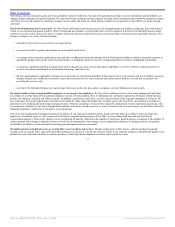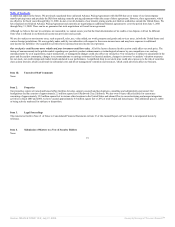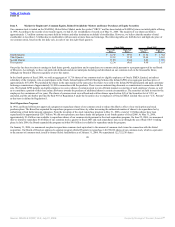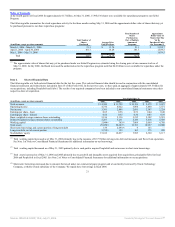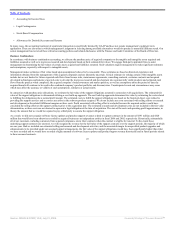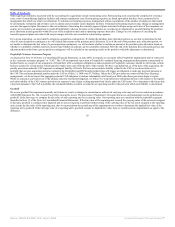Oracle 2005 Annual Report Download - page 20
Download and view the complete annual report
Please find page 20 of the 2005 Oracle annual report below. You can navigate through the pages in the report by either clicking on the pages listed below, or by using the keyword search tool below to find specific information within the annual report.
Table of Contents
Our foreign currency transaction gains and losses, primarily related to sublicense fees and other agreements among us and our subsidiaries and distributors, are
charged against earnings in the period incurred. We enter into foreign exchange forward contracts to hedge certain transaction and translation exposures in major
currencies, but we will continue to experience foreign currency gains and losses in certain instances where it is not possible or cost effective to hedge foreign
currencies.
Oracle On Demand may not be successful. We offer Oracle On Demand outsourcing services for our applications and database technology, delivered either at
Oracle or at a customer designated location. Oracle On Demand also includes several product lines we have acquired. Our Oracle On Demand business model
continues to evolve and we may not be able to compete effectively, generate significant revenues or develop Oracle On Demand into a profitable business. This
business is subject to a variety of risks including:
• demand for these services may not meet our expectations;
• we may not be able to operate this business at an acceptable profit level;
• we manage critical customer applications, data and other confidential information through Oracle On Demand and thus would face increased exposure to
significant damage claims in the event of system failures or inadequate disaster recovery or misappropriation of customer confidential information;
• we may face regulatory exposure in certain areas such as data privacy, data security and export compliance, as well as workforce reduction claims as a
result of customers transferring their information technology functions to us;
• the laws and regulations applicable to hosted service providers are unsettled, particularly in the areas of privacy and security and use of offshore resources;
changes in these laws could affect our ability to provide services from or to some locations and could increase both the cost and risk associated with
providing the services; and
• our Oracle On Demand offerings may require large fixed costs such as for data centers, computers, network infrastructure and security.
We may be unable to hire enough qualified employees or we may lose key employees. We rely on the continued service of our senior management and other
key employees and the hiring of new qualified employees. In the software industry, there is substantial and continuous competition for highly skilled business,
product development, technical and other personnel. In addition, acquisitions could cause us to lose key personnel of the acquired companies or at Oracle. We
may experience increased compensation costs that are not offset by either improved productivity or higher prices. We may not be successful in recruiting new
personnel and in retaining and motivating existing personnel. With rare exceptions, we do not have long-term employment or non-competition agreements with
our employees. Members of our senior management team have left Oracle over the years for a variety of reasons, and we cannot assure you that there will not be
additional departures, which may be disruptive to our operations.
Part of our total compensation program includes stock options. If our stock price performs poorly it may adversely affect our ability to retain or attract key
employees. In addition, since we will expense all stock-based compensation beginning in fiscal 2007, we may change both our cash and stock-based
compensation practices. Some of the changes we are considering include the reduction in the number of employees granted options, a reduction in the number of
options granted and a change to alternative forms of stock-based compensation. Any changes in our compensation practices or changes made by competitors
could affect our ability to retain and motivate existing personnel and recruit new personnel.
We might experience significant errors or security flaws in our products and services. Despite testing prior to their release, software products frequently
contain errors or security flaws, especially when first introduced or when new versions are released. Errors in our software products could affect the ability of our
products to work with other hardware or software products, could delay the development or release of new products or new
17
Source: ORACLE CORP, 10-K, July 21, 2006 Powered by Morningstar® Document Research℠


